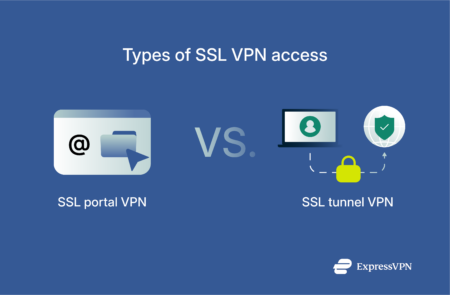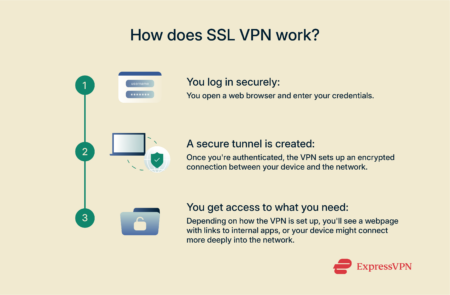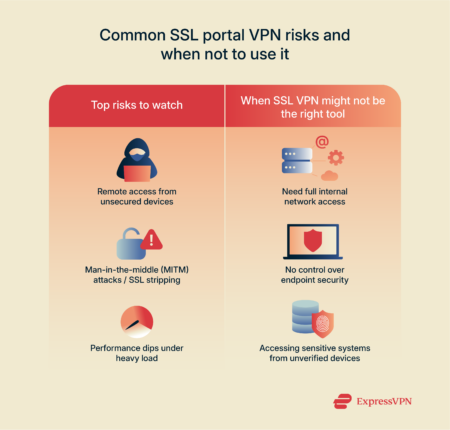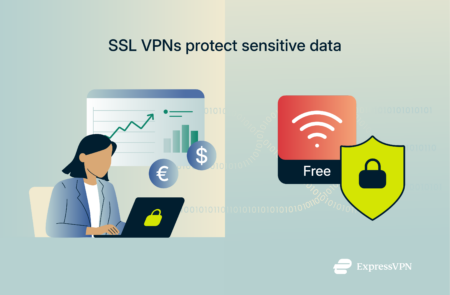SSL VPN (Safe Sockets Layer Digital Personal Community) is a software many organizations depend on to safe distant work periods and handle entry to sources. However what precisely is an SSL VPN, and the way does it work? And why are so many companies selecting it over conventional VPN applied sciences?
This information breaks it down clearly. You’ll study what SSL VPNs do, how they shield knowledge utilizing encryption, how they evaluate to IPsec VPNs, and the place they match into the larger image of community safety.
What’s an SSL VPN?
There are 2 kinds of SSL VPN: tunnel mode and portal mode.

SSL portal VPN
An SSL portal VPN is the one individuals are extra generally referring to once they point out SSL VPN. It’s a software that allows you to connect with a personal community securely over the web utilizing a normal internet browser.
It creates an encrypted hyperlink between your system and a distant server, letting you entry inner techniques, information, or apps with out being bodily on the identical community.
As a substitute of requiring a devoted VPN shopper, SSL portal VPNs typically join by means of a normal internet browser over HTTPS (the identical encryption that retains web sites like your financial institution or e-mail supplier safe). This makes it simpler to make use of and extra versatile throughout gadgets, whether or not you’re on a laptop computer, pill, or cellphone.
It’s a go-to answer for corporations with distant groups, touring employees, or anybody who wants secure, dependable entry to inner techniques from wherever.
- Finest for: On a regular basis duties, web-based instruments, restricted person entry.
- Setup wanted: None—works in your browser.
SSL tunnel VPN
Tunnel mode provides you extra entry. After logging in, it creates a safe path between your system and the community, so you need to use apps that aren’t web-based—like distant desktop or firm software program.
To allow full tunnel entry, SSL VPNs require a shopper—usually a light-weight app or helper put in in your system. This shopper units up a digital community interface (much like your Wi-Fi or Ethernet adapter), which may’t be created or configured by means of a browser alone. It’s what makes it potential to route all of your system’s visitors securely by means of the VPN, not simply internet apps.
- Finest for: Full-time distant staff, deeper community entry.
- Setup wanted: Requires set up of a devoted VPN shopper or light-weight helper app.
Most SSL VPNs depend on TLS (Transport Layer Safety), the fashionable substitute for SSL encryption. Though TLS is the usual at this time, the time period “SSL VPN” continues to be broadly used.
How does SSL VPN work?
If you hook up with an SSL VPN, right here’s what occurs within the background:
- Log in: You open an internet browser and go to a login web page. After coming into your credentials––like a username, password, or possibly a code from an app—the system checks that you just’re allowed in.
- A safe tunnel is created: When you’re authenticated, the VPN units up an encrypted connection between your system and the community. It makes use of TLS (the fashionable model of SSL) to guard your knowledge, so nobody can see or tamper with what you ship or obtain, even should you’re on public Wi-Fi.
- You get entry to what you want: Relying on how the VPN is ready up, you may land on a portal web page with hyperlinks to inner apps (portal mode), or the login course of may set off an put in VPN shopper to ascertain a full community connection (tunnel mode).

 In portal mode, every part works by means of your browser with no further software program wanted. In tunnel mode, you want a VPN shopper app to create a safe connection. Both means, your knowledge stays protected, and you may work securely from nearly wherever.
In portal mode, every part works by means of your browser with no further software program wanted. In tunnel mode, you want a VPN shopper app to create a safe connection. Both means, your knowledge stays protected, and you may work securely from nearly wherever.
Which kind of SSL VPN is true for your small business?
Choosing the proper sort of SSL VPN will depend on how a lot entry your customers want and the way your community is ready up.
- If customers simply have to verify e-mail, entry a couple of inner websites, or use web-based instruments, portal mode is commonly sufficient. It’s fast to arrange and straightforward to make use of.
- If customers have to run full packages, use distant desktop, or entry providers that aren’t browser-based, tunnel mode is the higher match. It provides them extra freedom to work like they’re contained in the workplace community.
Some companies use each. For instance, they may give contractors entry by means of portal mode, whereas full-time staff use tunnel mode for deeper entry. The fitting selection comes all the way down to balancing ease of use, safety wants, and who’s accessing what.
SSL VPN vs. IPsec VPN: Key variations
SSL and IPsec are two of essentially the most broadly used VPN applied sciences. Each shield knowledge and allow distant entry, however they work in numerous methods and are constructed for various use circumstances.
Listed below are the important thing variations.
Community layer vs. utility layer
The largest technical distinction between IPsec and SSL VPNs is the place they function inside the OSI mannequin. IPsec VPNs work on the community layer (Layer 3), that means they shield all visitors between your system and the community. As soon as linked, it’s such as you’re plugged into the workplace. Every thing runs by means of the VPN, from file transfers to background apps.
SSL portal VPNs function on the utility layer (Layer 7), that means you may solely entry particular providers—like internet apps, e-mail, or inner dashboards—by means of your browser. It’s a centered, clientless setup: you work together solely with accredited instruments, and every part else on the community stays off-limits.
SSL tunnel VPNs are extra advanced. Whereas they set up the connection over the transport, session, and presentation layers (Layers 4–6), the information they carry consists of Layer 3 (community) packets. This setup requires a VPN shopper and provides your system broader entry to the inner community—virtually as should you had been bodily plugged in on the workplace.
Principally, IPsec and SSL tunnel VPNs are nice for full community entry or site-to-site connections between workplaces, whereas SSL portal VPNs are perfect if you need extra management over what customers can see or do.
Safety and encryption
Each SSL and IPsec VPNs use robust encryption, however they deal with it in numerous methods.
IPsec VPNs encrypt all IP packets between your system and the distant community, no matter which app or service is working. This makes IPsec perfect for full-tunnel setups the place each connection—browser, e-mail, software program—is protected by default.
SSL VPNs, alternatively, use TLS encryption—the identical type used to safe web sites (that’s the “S” in HTTPS). In portal mode, TLS protects entry to particular internet apps or providers by means of your browser. In tunnel mode, SSL VPNs can present full community entry much like IPsec however nonetheless use TLS to ascertain the safe tunnel.
Each are safe when arrange correctly. The higher selection will depend on how a lot entry you’re giving and the way versatile you want the setup to be.
Consumer authentication and entry management
One other key distinction between SSL and IPsec VPNs is how customers log in and what they will entry as soon as linked.
IPsec VPNs normally require putting in a VPN shopper on the person’s system. These setups typically verify each the person’s id and the system itself. As soon as linked, customers usually get full entry to the community, except stricter controls are manually arrange. SSL tunnel VPNs supply equally large entry.
SSL portal VPNs, alternatively, are easier. You log in by means of a webpage, and entry may be tailor-made to the particular person. It’s simpler to provide customers entry to only the instruments they want—like particular apps or information—with out opening the door to your entire community.
This makes SSL portal VPNs a greater match if you want extra management over who will get entry to what, particularly for distant staff or third-party customers.
Deployment and administration
Organising an IPsec VPN normally takes extra effort and time. You typically want to put in software program on every person’s system, take care of certificates, and configure every part to work throughout totally different networks and firewalls. It really works effectively, however it takes extra hands-on administration. The identical is true of SSL tunnel VPNs, which additionally contain the usage of VPN shopper software program.
SSL portal VPNs, alternatively, are a lot simpler to roll out. Since they run by means of a browser, there’s normally nothing to put in. IT groups can handle entry from one place and apply settings to all customers without delay, which saves time and reduces setup points.
In case your crew is giant, distant, or utilizing a mixture of private and work gadgets, SSL portal VPNs are usually sooner and simpler to handle.
Efficiency and velocity comparability
Each SSL and IPsec VPNs can supply robust efficiency, however there are some variations in how they deal with visitors.
IPsec VPNs are sometimes used to attach total networks and shield all visitors between two places. They’re an awesome selection for securely dealing with regular, high-volume knowledge throughout websites.
SSL tunnel VPNs are additionally good at dealing with heavy visitors, however SSL portal VPNs are well-suited for particular distant work duties—like accessing internet apps, inner dashboards, or shared paperwork. As a result of they give attention to particular purposes as a substitute of the entire community, they might be sooner to attach and simpler on bandwidth, relying on what you’re utilizing them for.
That stated, real-world velocity will depend on a number of elements—like community setup, server load, VPN encryption settings, and your web connection—not simply the VPN protocol itself.
| Characteristic | SSL portal VPN | IPSec or SSL tunnel VPN |
| Layer of operation | Utility layer–secures particular apps | IPSec: Community layer—secures all visitors
SSL tunnel VPN: Transport, session, and presentation layers |
| Entry technique | Browser-based (HTTPS) | Requires devoted VPN shopper |
| Consumer entry management | High quality-grained (per app/service) | Broad (full community, except restricted) |
| Setup complexity | Straightforward to arrange and handle | Extra advanced—software program, certificates, firewall configuration |
| System compatibility | Works on any system with a browser | Wants VPN software program put in |
| Use circumstances | Distant work, contractors, limited-access customers | Web site-to-site hyperlinks, full distant entry |
| Efficiency | Optimized for gentle to average use (internet apps, e-mail, dashboards) | Handles heavy visitors higher (VoIP, giant transfers) |
| Safety | TLS encryption, safe when correctly configured | Sturdy encryption at packet degree, safe when correctly configured |
On-premise vs. cloud deployment
One other key distinction to contemplate is the place the VPN infrastructure is hosted. IPsec VPNs and SSL tunnel VPNs are extra generally deployed on-premise, that means your group owns and maintains the {hardware} and software program. This provides you full management over the setup but in addition means extra duty for updates, safety, and upkeep.
SSL portal VPNs are sometimes simpler to combine with cloud-based providers. Many suppliers supply SSL portal VPNs as managed options, making it easier to scale entry for distant customers with out the heavy lifting of working your personal VPN servers.
For companies transferring towards cloud-first operations, SSL portal VPNs can present a extra versatile, low-maintenance possibility. For organizations that need most management, IPsec VPNs or SSL tunnel VPNs deployed on-premises should be the higher match.
When selecting between IPsec and SSL tunnel VPNs, companies may wish to contemplate that there’s wider OS assist for IPsec VPNs, however that SSL VPNs usually tend to work on a variety of distant gadgets with out entry points (which may be helpful if in case you have numerous staff engaged on their very own gadgets from house).
Which VPN sort is safer?
Each IPsec and SSL VPNs use robust encryption and may be extremely safe—however safety isn’t nearly encryption. Actual-world vulnerabilities typically come up from how the VPN is deployed and maintained, not the protocol itself.
IPsec VPNs encrypt all visitors between two endpoints, making them well-suited for full-tunnel setups or site-to-site connections between workplaces. As a result of IPsec operates on the community layer, it usually exposes fewer providers on to the web, which may scale back the assault floor.
SSL VPNs, particularly in portal mode, introduce a broader assault floor. The net portal—accessible by means of a browser—is instantly linked to inner providers like e-mail, dashboards, and apps. If this portal has a vulnerability, it turns into a gorgeous goal for attackers.
And bear in mind, safety all the time will depend on correct configuration. Weak passwords, outdated software program, or poorly managed entry can flip any VPN right into a danger—whatever the protocol.
Advantages of utilizing SSL VPN
Enhanced safety and encryption
SSL VPNs shield your knowledge with the identical sort of encryption utilized by safe web sites—TLS (Transport Layer Safety). It’s the “S” in HTTPS. This encryption retains your connection non-public, so nobody can see or tamper with what you ship and obtain.
As a result of SSL portal VPNs run over commonplace internet ports (like port 443), in addition they bypass most firewalls with no need particular configuration. Which means a safer connection, even on public Wi-Fi or unfamiliar networks.
Distant entry with out software program set up
One of many greatest benefits of SSL portal VPNs is how easy they’re to make use of. You don’t want to put in any further apps or mess with advanced settings. You simply open a browser, log in, and also you’re in.
Which means fewer setup points, fewer assist tickets, and sooner entry—particularly useful for folks utilizing their very own gadgets or working from someplace new.
Compatibility with internet browsers and cellular gadgets
SSL portal VPNs work on virtually something. So long as the system has a browser and an web connection, you may log in securely—irrespective of if it’s a laptop computer, cellphone, or pill.
There’s no have to match a selected working system or set up particular software program. That makes it simpler to assist distant groups utilizing totally different gadgets. From working at house to touring or switching between private and work gadgets, they keep linked.
Enterprise continuity and safe workforce mobility
Work doesn’t all the time occur at a desk within the workplace. Folks transfer round, change gadgets, or make money working from home—and generally sudden occasions can happen, like workplace closures, dangerous climate, or journey disruptions.
An SSL portal VPN helps groups keep linked by means of all of it. It provides folks safe entry to what they want with out leaping by means of hoops. No particular gear, no sophisticated setup. Only a browser and a connection. Using a VPN for remote work is a rising development, particularly when flexibility and knowledge safety are high priorities.
It’s a sensible solution to hold issues working, irrespective of the place your crew is.
Potential dangers and limitations of SSL VPN
SSL portal VPNs make distant entry simpler and extra versatile—however like every expertise, they arrive with trade-offs. Understanding the dangers helps you propose higher and keep away from widespread pitfalls. Right here are some things to be careful for.
Safety vulnerabilities and assault vectors
As a result of SSL portal VPNs may be accessed through an internet portal, any potential vulnerability within the portal software program may be catastrophic. This isn’t a difficulty with IPSec VPNs or SSL tunnel VPNs, which require the set up of a shopper.
If the SSL VPN portal is compromised, an attacker may perform a man-in-the-middle (MITM) attack. For instance, they might modify the portal software program so each time you enter your password, the portal sends your credentials to them.
In some circumstances, attackers may additionally use SSL stripping tactics, attempting to downgrade safe HTTPS periods to unencrypted HTTP to steal delicate data. Insecure public networks or misconfigured certificates make this type of assault extra doubtless.
To cut back this danger, organizations ought to use robust digital certificates and prepare customers on easy methods to determine suspicious connections.
Efficiency concerns
SSL portal VPNs are nice for day-to-day duties like e-mail, internet apps, and file sharing—however they’re not all the time the most effective match for high-bandwidth wants like giant file transfers or VoIP. For higher-bandwidth duties, an SSL tunnel VPN is a better option.
Efficiency will depend on a couple of key issues:
- VPN server capability: How a lot visitors it may well deal with without delay.
- How many individuals are linked: Extra customers can sluggish issues down.
- Encryption power: Stronger encryption can take extra processing energy.
- Community high quality: Weak connections or public Wi-Fi may cause points.
You may discover slowdowns throughout busy instances , however for many distant work, SSL portal VPNs give quick, regular entry with no need any further {hardware}.
When to not use SSL VPN
If customers want full community entry—similar to when working with inner databases, managing techniques, or connecting total workplace branches—an IPsec VPN or an SSL tunnel VPN is the higher possibility. SSL portal VPNs are designed for application-level entry, not full-network tunneling by default.
They’re additionally not perfect in environments the place you may’t implement robust endpoint safety—like unmanaged gadgets or public terminals, which could go to unsecured HTTP pages and improve publicity. With out correct controls, even a safe connection may be undermined by malware or compromised browsers.
In these circumstances, it could be safer to require entry from company-issued gadgets or prohibit entry to particular low-risk instruments.

SSL VPN use circumstances and business purposes
SSL VPNs aren’t only for tech corporations—they’re used throughout a variety of industries to provide folks safe, versatile entry to the techniques and instruments they want. Right here’s how totally different sectors use them to maintain work transferring whereas maintaining knowledge protected.
Healthcare: Safe entry to affected person knowledge
In healthcare, fast entry to affected person knowledge can’t come at the price of safety. Medical doctors, nurses, and different employees typically want to tug up information from house, satellite tv for pc clinics, or whereas on the transfer—and SSL portal VPNs make that potential with out exposing delicate data.
As a result of the connection is encrypted with SSL/TLS, it retains affected person knowledge protected whereas in transit. Healthcare organizations may also management entry by function, making certain every person solely sees what they want. That’s not simply sensible; it’s important for assembly strict guidelines like HIPAA.
Telemedicine, cellular diagnostics, or checking charts after hours—SSL VPNs assist hold all of it safe, irrespective of the place the work occurs.
Finance: Defending delicate transactions

 Finance professionals take care of delicate knowledge day by day—shopper information, banking credentials, funding data—and that makes them a chief goal for cyberattacks. SSL VPNs assist shield that knowledge by encrypting every part that strikes between their gadgets and the community, whether or not they’re within the workplace or working remotely.
Finance professionals take care of delicate knowledge day by day—shopper information, banking credentials, funding data—and that makes them a chief goal for cyberattacks. SSL VPNs assist shield that knowledge by encrypting every part that strikes between their gadgets and the community, whether or not they’re within the workplace or working remotely.
This type of safety is crucial when accessing monetary techniques from house or over public Wi-Fi. By making a safe tunnel, SSL VPNs hold transactions non-public and be sure that unauthorized eyes can’t intercept account particulars or vital enterprise knowledge.
Enterprise IT: Distant workforce safety
Many organizations have staff working from totally different places, utilizing totally different gadgets, at totally different instances. That creates a problem for IT groups: easy methods to present safe entry to inner techniques with out making the setup overly sophisticated?
SSL portal VPNs assist resolve that. They permit customers to attach securely by means of an internet browser with no need further software program or particular {hardware}. That makes them sensible for groups that use private laptops, make money working from home, or transfer between workplaces.
From a company IT perspective, SSL portal VPNs are simpler to handle. Entry may be adjusted primarily based on the person’s function, and every part may be managed centrally. This ease of deployment and suppleness are why many organizations proceed to depend on SSL portal VPNs for distant entry—particularly when a full zero-trust setup isn’t in place but.
Schooling: Enabling distant studying securely
Universities and colleges don’t simply run on campus anymore. College students and employees want secure entry to studying platforms, e-mail, and analysis instruments from dorms, libraries, houses—or wherever they’re. That’s the place SSL VPNs assist.
SSL VPNs make it easy to attach by means of a browser or a light-weight app with no need advanced setup. College students can simply attain what they want for lessons, whereas lecturers and employees can get broader entry to inner techniques, relying on their roles.
The massive benefit is management. Colleges can handle who will get entry to what, maintaining delicate techniques protected whereas making distant studying easy and safe.
FAQ: Widespread questions on SSL VPN
It will depend on what you want. An SSL portal VPN is easier to set up, works in any browser, and is nice for distant entry to particular apps or instruments. IPsec VPN is healthier for full community entry and site-to-site connections, however it wants particular software program and requires extra intensive setup. The identical is true for SSL tunnel VPNs. One isn’t higher than the opposite throughout the board—they’re simply constructed for various conditions.
SSL portal VPNs are versatile, however they’re not excellent. They are often much less efficient for high-bandwidth duties like giant file transfers or VoIP. Public or shared gadgets additionally pose dangers in the event that they aren’t safe. And since they give attention to particular purposes, they may not be the best fit when full network access is needed.
SSL VPN is secure when it’s properly set up. It makes use of TLS encryption—the identical encryption that protects HTTPS web sites—to maintain your knowledge non-public. However like every software, it will depend on the way it’s managed. Weak passwords, outdated software program, or poor entry controls can nonetheless create dangers.
No, not all VPNs use SSL. Some, like IPsec VPNs, use totally different encryption strategies and function on the community layer. SSL VPNs use TLS encryption and are centered on safe entry by means of internet browsers. The kind of VPN used will depend on the setup and how much entry is required.
Sure, SSL VPNs work on most smartphones and tablets. Since SSL portal VPNs run by means of commonplace internet browsers and don’t normally want further software program, they’re a very good match for cellular entry. Some suppliers additionally supply apps for smoother efficiency on iOS and Android if deeper entry is required.
It could actually, however normally not by a lot. Like every VPN, SSL VPN routes your visitors by means of a safe tunnel, which may add somewhat overhead. The precise velocity will depend on your web connection, the VPN server, and the way a lot knowledge you’re sending. For many duties—like emails, apps, or internet entry—it’s quick sufficient to really feel seamless.
A daily VPN normally refers to IPsec VPN, which encrypts all network traffic and often requires special software. SSL portal VPNs, alternatively, run by means of your browser and safe entry to particular apps or providers. They’re easier to make use of and work effectively for distant entry with out giving full community management. There are additionally SSL tunnel VPNs, which perform extra like IPsec VPNs and are a sensible choice for broader community entry and bandwidth-intensive duties.













